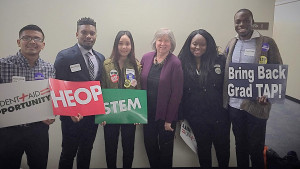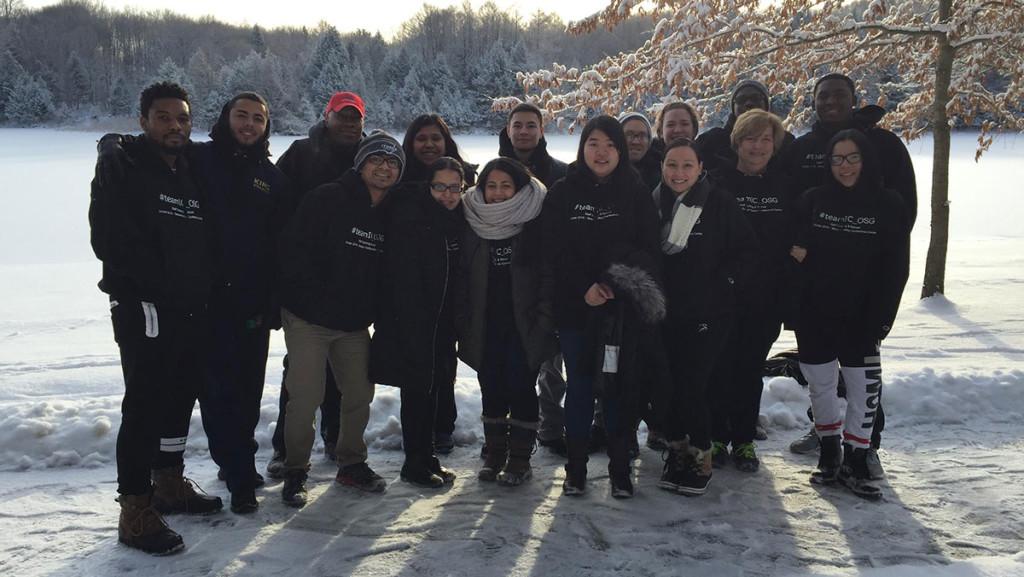After benefiting greatly from financial aid, many Ithaca College students have been prompted to assist their peers in similar circumstances succeed academically as peer mentors in the Office of State Grants.
The Office of State Grants, located in Rothschild Place, is home of the Higher Education Opportunity Program, a program that supports academically and economically disadvantaged residents of New York state in achieving a postsecondary education.
Junior Omar Stoute benefited directly from the HEOP and now works in the office as a peer mentor for other students in the program. He grew up in a single–parent household with his mother, who died during his sophomore year.
“I was going to go to college without a doubt,” he said. “But the level of college I was going to be able to attend or afford was directly impacted by this program.”
In New York state, more than 370,000 students benefit from state student aid programs, such as those the Office of State Grants is involved in, each year. Orlando Kittrell, director of the Office of State Grants, estimates about 150 students benefit from the office each year. There are 10 peer mentors, including Stoute.
In February, recent graduate Cristian “Alex” Gomez-Perez, Stoute and several other students working with the office attended Advocacy Day in Albany, New York, an event put on by the Commission on Independent Colleges and Universities, to allow for state senators and legislators to meet students who benefit from the office’s resources, which they vote on the budget for. The event is one of many ways in which students in state student aid programs in New York reach out to state officials to advocate for funding.

Stoute, who went to the event for the second year in a row, said he believes his stories and those of his peers really do impact how the lawmakers view student aid.
“Just going and saying, ‘Thank you,’ and putting a number to a face because, to a lot of them, it’s just, ‘58 students are going to college,’” Stoute said. “But you know, ‘Omar going to college, John going to college,’ it makes a difference.”
Kittrell said student advocacy for state student aid programs creates awareness among decision-makers about why funding for the programs is important and awareness on the part of students in understanding how the process of deciding on funding for their programs works.
“You’re looking for champions in the assembly … in the Senate, in the legislative branch of New York state,” he said. “Advocacy and lobbying — it’s about making those that make decisions, aware of the successes, the struggles of students, who are going to become taxpayers.”
Junior Carlos Grimes, a business administration major, said his peer mentor is important because he is there for students every day and can relate to them on a personal level.
“These peer mentors are kind of like the backbone,” he said. “Some people actually think, ‘Oh, they’re a peer mentor, they’re a student, not many people are going to be OK with opening to student,’ but that’s actually not true. They’re actually better because they’re more relatable.”
Grimes recently took up a management concentration in the School of Business, at the advice of Kittrell, so he could have a better chance of getting into graduate school. One concern Grimes had was affordability. He said he was planning on paying for his GRE graduate school entry exam using money he made at his internship until Kittrell insisted on finding a way for the office to pay for it.
“He’s like, ‘No, just fill out the application, and I will find a way to supply you with the necessary tutoring that you need because if you’re serious about it, we’re going to pay for it,’” Grimes said.
Gomez-Perez is beginning the graduate program for a Masters of Science in Childhood education in June at the college. This fall, he began his job as a peer tutor at the office.
“I wanted to give back,” he said. “I knew I wanted to be a part of that program, which has given me so much. … I knew I wanted to be around those students and also be able to teach them what I know.”
Grimes said out of all the schools he looked at, the college had the best program for him because of the office’s genuine care for students. He said there is no hesitation to help on behalf of peer mentors, peer tutors and staff in the office.
“If you need an internship, ask a question, and you will find the internship,” he said. “If you need a recommendation letter, you will have a recommendation letter. If you need to eat, they will buy you food.”








